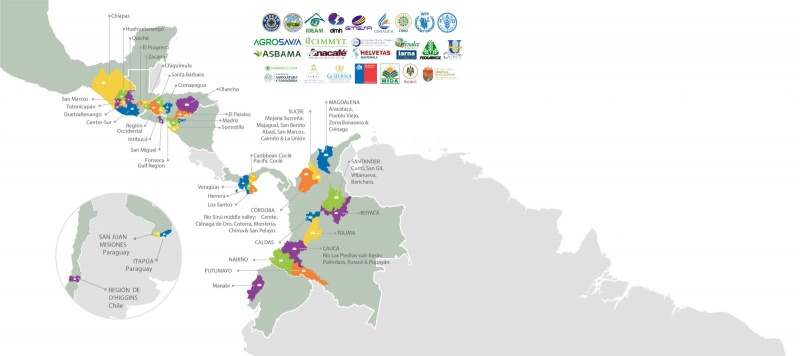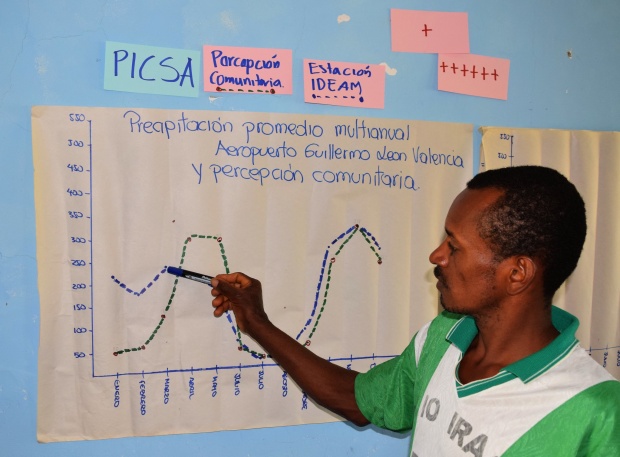Climate services are helping Latin America agricultural sector to close the gap between climate information, knowledge and its use by farmers.
Climate information has become a precious commodity for thousands of farmers in Latin America, who use it to make decisions and plan their crops while they battle with different extreme climate events. However, the mere availability of information is not sufficient. More comprehensive climate services—the generation, translation, communication and use of climate information products and knowledge that fit the context and meet the need of users—are crucial to increase resilience to climate variability and change.
The Alliance of Bioversity International and the International Center for Tropical Agriculture (the Alliance) and the CGIAR Research Program on Climate Change, Agriculture and Food Security (CCAFS) are working in Latin America in partnership with different institutions to close the gap between climate information, knowledge and its use by farmers through different approaches.
Related topics: Flipping the script on rainfall data – Latin America strengthen cooperation for climate action – What is Behind Protests in Latin America: Inequality
These approaches were presented during the sixth International Conference on Climate Services (ICCS 6) which took place in Pune, India, at the Indian Institute of Tropical Meteorology (IITM). The Agriculture and Food Security parallel sessions led by CCAFS had a crucial role in discussing the progress of climate services, challenges and opportunities in the agricultural sector, covering approaches and themes such as:
- Co-production: approach recognizing the distinct roles and responsibilities of the public and private sector, academic institutions, research and technological agencies in the provision of climate services.
- Participatory research (e.g. Participatory Integrated Climate Services for Agriculture (PICSA): methodology linked to the farmers’ decision-making context, associated with Farming Systems Research.
- Innovative digital farmer advisory services, and the potential of mobile apps as part of climate services delivery to engage in a two-way dialogue.
- The role of business models: how to change the traditional model in which the National Meteorological and Hydrological Services (NMHSs) operate in order to improve climate services in developing countries.
- The role of monitoring and evaluation
- Effectiveness, scalability and sustainability
Climate services in action
Climate services must fit the farmers’ context and meet their needs. For example, in the PICSA approach, the engagement of farmers is vital for the success of climate services. Working with farmers in a participatory manner can help support their planning, evaluate its influence on their decision-making processes, households and innovation behavior. Currently, PICSA is implemented in Colombia, Honduras and Guatemala, helping farmers to better understand their local climate and resources, identify potential responses to climate forecasts and is facilitating the implementation of their choices, among others.
Establishing Local Technical Agroclimatic Committees (LTAC) is another approach that has allowed an estimated 330,000 Latin American farmers to participate in open and clear dialogues about climate variations, how these can affect their crops, and to co-design measures to reduce crop loss, particularly providing agronomic recommendations. Thirty-nine LTACs have been implemented in ten Latin American countries, engaging more than 266 public and private institutions, helping to increase the resilience and food security of rural communities and transforming the way farmers manage climate risk.

LTACs and their integration with other local processes have led to changes in farmers’ management practices. Source: Scaling-up climate services with users in Latin America
Diana Giraldo, Bioversity–CIAT/CCAFS researcher and PhD student at the University of Reading, highlighted the progress that has been made between information providers and users: “It was interesting to see at the conference how institutions are now developing products and services tailored to farmers’ needs, where the participation of the farmer and collaboration with other institutions in dialogue platforms are developed from the beginning.”
Giraldo argued it was necessary to develop two-way communication channels (e.g. radio, text messages, interactive platforms, videos) between farmers and extension agents, to strengthen and continue building capacities, where the key to an effective climate service is a complete intersection of knowledge and its use by farmers. In the end, in order to make climate services sustainable and scalable, it is necessary to have a collaborative network between scientists, farmers and stakeholders, which remains a vital step to ensure that information is properly available, disseminated and used.
Below you can find the links to the presentations about the advances on climate services in Latin America by the researchers who participated in the conference:
- Demand and supply: Evaluation agro-climate information products
- U-P Interface: Local Technical Agroclimatic Committees (LTACs)
- Decision-making: Participatory Integrated Climate Services for Agriculture (PICSA)
- Scaling-up: Busting the myth that pilots never scale
About the author: Diana Giraldo is a researcher for the Alliance of Bioversity International and CIAT. Lauren Sarruf Romero is Communications Officer for CCAFS Latin America.
EDITOR’S NOTE: The opinions expressed here by Impakter.com columnists are their own, not those of Impakter.com. Photo Credit: L. Ortega (Ecohabitats Foundation)











